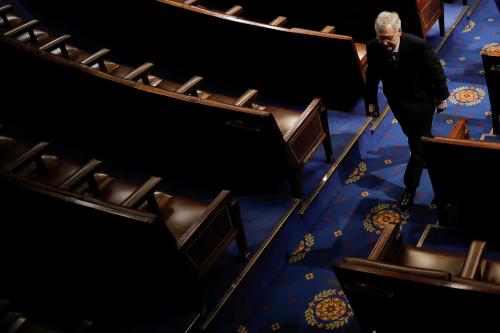Today (May 31, 2013) marks the 100thanniversary of the adoption of the 17th Amendment. With such an important milestone, it is worth pausing to ask the question of what our country has gained from a century of directly electing its senators. In a recent posting by Governance Studies at Brookings in our Issues in Governance Studies, we published a paper by Wendy Schiller (Brown University) and Charles Stewart III (Massachusetts Institute of Technology) entitled “The 100th Anniversary of the 17th Amendment: A Promise Unfulfilled?”
Using an original data set of roll call votes for U.S. senator taken in all state legislatures from 1871-1913, Schiller and Stewart investigate the dynamics of Senate elections in the indirect system. They argue that the 17th Amendment has failed to deliver and has produced a Senate even less responsive to voters than under the indirect election system. Characteristics of Senate elections in the indirect age parallel today’s Senate in terms of the types of candidates that run, the role of money in elections, the influence of partisanship, and the nature of Senate ideological and legislative behavior.
Some of the main takeaways are the following:
- Corruption and inefficiency in indirect elections (by state legislature) were the driving forces behind the emendation, one part of the Progressive movement for more open, accessible, and responsive government.
- Under indirect elections, the pool of candidates was deep with experienced politicians who wanted to remain in office, similar to today.
- Despite the blatant use of money to win indirect Senate elections, 100 years after the 17th Amendment was enacted, the modern Senate elections process is swamped with campaign money in ways that far outpace elections under the indirect elections system.
- In the Senate, polarization was high under indirect elections and then decreased after the adoption of the 17th Amendment. Yet it began to increase in the late 1970’s and is now as large as significant as it was under the indirect elections system.
- Today’s senators are no more responsive to constituent needs than their counterparts elected indirectly by their state’s legislature.
The dysfunction associated with the modern Senate extends well beyond the election of its members. Inherent flaws in the Senate’s construction should be recognized and voters should be wary of false promises. It’s worth reflecting, now, on the effects of this constitutional change on democracy in America.
Read the full paper on the 100th anniversary of the 17th Amendment here »



Commentary
A Century Later: The Adoption of the 17th Amendment on Direct Election of Senators
May 31, 2013